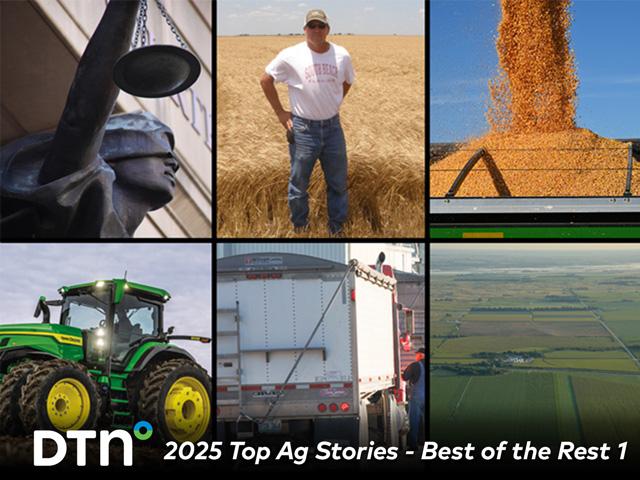Washington Insider-- Friday
Continuing WTO Leadership Fight
Here's a quick monitor of Washington farm and trade policy issues from DTN's well-placed observer.
USDA Ups FY 2021 Ag Export Forecast, Notes Strong Demand from China
U.S. agricultural exports are now expected to reach a value of $152.0 billion in Fiscal Year (FY) 2021, up from $140.5 billion in August, while the value of imports is now seen at $137 billion, up from $136 billion, with higher soybean and corn export values and strong demand seen driving the forecast bump.
The outlook sees FY 2021 with an agricultural trade surplus of $15 billion. For FY 2020, USDA recorded exports of $135.9 billion, up slightly from the $135 billion forecast in August, while the value of imports is seen at $133.2 billion, up from the $131.7 billion previously forecast. Those totals put the FY 2020 agricultural trade surplus at just $2.7 billion.
US Slaps Duties On Phosphate Fertilizer From Morocco And Russia
A preliminary determination imposing countervailing duties on imports of phosphate fertilizer from Russia and Morocco was announced by the Commerce Department.
The decision was scheduled to be released November 23 but came one day late. The department set preliminary duties of 23.46% on imports from Morocco's OCP Group and other producers in the country, 20.94% on those from Russia's Phosagro, 72.50% on EuroChem and 32.92% on all other Russian producers. The decision follows an investigation launched in July on petitions filed by US-based fertilizer company Mosaic Co.
The US imported about $729 million worth of phosphate fertilizer from Morocco and about $299 million from Russia in 2019, according to Commerce.
A final Commerce Department decision is expected February 8, followed by the International Trade Commission's (ITC) final decision on March 25, with the issuance of an order on April 1.
Washington Insider: Continuing WTO Leadership Fight
The World Trade Organization has been without a boss — the Director General — since September, when Roberto Azevedo stepped down one year before the end of his mandate. Since then, the 164 members that make up the organization have been discussing who his replacement should be.
P[L1] D[0x0] M[300x250] OOP[F] ADUNIT[] T[]
There were 8 candidates in the running but only two remain: South Korea's Yoo Myungâ??hee and Nigeria's Ngozi Okonjoâ??Iweala.
WTO members appoint the Directorâ??General by consensus, CATO reminds and consensus has been growing around the candidacy of Okonjoâ??Iweala, a former finance minister and World Bank managing director. But in recent discussions in Geneva, the United States signaled that it would not support her candidacy.
The U.S. already has made the WTO's appeals court nonâ??functional by blocking the appointment of any new judges, making it impossible to hear appeals. By threatening to veto the appointment of a new DG the U.S. only amplifies the message that trade policy watchers have long known — the U.S. is basically interested in the WTO, CATO said.
It notes that it is not surprising that there is “some drama” over the nomination of a Directorâ??General, given the fact that it is a position that serves a number of important roles, including the management of the day to day operations in Geneva, and serving as an honest broker between the WTO's 164 members. The value of the Directorâ??General is in setting the tone for the organization, and perhaps in a more limited way, influencing the direction of the organization as well.
So, while the WTO Directorâ??General does not play a role in policymaking, she can serve a critical role in facilitating discussions and getting negotiations across the finish line, CATO says.
Bloomberg reports this week that sources close to US Trade Representative Robert Lighthizer say he “views Okonjoâ??Iweala as being too close to proâ??trade internationalists in Washington like Robert Zoellick, a former USTR who worked with Okonjoâ??Iweala when he was president of the World Bank,” even though she also holds U.S. citizenship.
Lighthizer's disdain for the WTO is well documented, as are his protectionist views, “which have not only failed to live up to his promise of manufacturing revival but have been disproportionately shouldered by US consumers,” CATO says.
Nominating someone to the Director-General's post that not only understands the benefits of trade and the costs of protectionism “works against the policies Lighthizer has pushed for as USTR,” CATO says.
Furthermore, for the U.S. to support a candidate who is highly unlikely to ever garner support from China also raises suspicion that the threat of a veto is simply exercised to enhance tension in the organization.
However, Bloomberg is reporting this week that the fight is still active to the point that wagering “in a locked-down Geneva this month” is often focused on whether South Korea's Yoo Myung-hee will withdraw from the race to lead the World Trade Organization.
But Bloomberg reports that despite what's been written in various news reports, “Yoo has not withdrawn from the race but hasn't responded to questions about whether she'll stay in the running.”
To some members, Yoo's candidacy became toxic the moment the US unilaterally blocked Okonjo-Iweala a month ago. It's still a bit of a head-scratcher why Washington vetoed a highly respected economist with verifiable reform credentials to lead the WTO. She's also an American citizen.
The office of U.S. Trade Representative offered scant details about why it opposes Okonjo-Iweala, other than to say Yoo has the “skills necessary to be an effective leader of the organization.”
So, Bloomberg takes a flyer—in the absence of a clear reason, it offers some “possible strategies that USTR Robert Lighthizer may be pursuing.”
The first may be that the U.S. “believes that Yoo is the better candidate because she has real, hands-on experience in the field” and Okonjo-Iweala doesn't, Bloomberg says.
Or, the U.S. may want to advance a third candidate to lead the global trade organization; or, it may want to extract some other concession unrelated to the WTO's leadership race; or, it may simply want to force WTO members to vote on the matter, an unprecedented exercise seen as damaging to a consensus-oriented institution.
Bloomberg also argues that the U.S. sees a leadership void and chaos at the WTO as beneficial to America's interests.
While any of these options are possible, the Cato Institute's Simon Lester told Bloomberg that the multi-dimensional outcome concerning “possible concessions” seems to be the most plausible explanation.
“The administration has been using economic leverage to extract concessions from trading partners at every opportunity, and it would not be surprising if it were to use the director-general selection process for this purpose as well,” Lester said.
President-elect Joe Biden, who has supported multilateral organizations in the past is expected by some to move to end the impasse in the WTO leadership race — but not until after his inauguration on Jan. 20.
So, for now, Geneva remains in a wait-and-see posture with low expectations that the WTO's drift into dysfunction will be resolved anytime soon. This is yet another issue that producers should watch closely as the new US trade policy continues to be discussed, and to evolve Washington Insider believes.
Want to keep up with events in Washington and elsewhere throughout the day? See DTN Top Stories, our frequently updated summary of news developments of interest to producers. You can find DTN Top Stories in DTN Ag News, which is on the Main Menu on classic DTN products and on the News and Analysis Menu of DTN's Professional and Producer products. DTN Top Stories is also on the home page and news home page of online.dtn.com. Subscribers of MyDTN.com should check out the US Ag Policy, US Farm Bill and DTN Ag News sections on their News Homepage.
If you have questions for DTN Washington Insider, please email edit@dtn.com
(c) Copyright 2020 DTN, LLC. All rights reserved.



